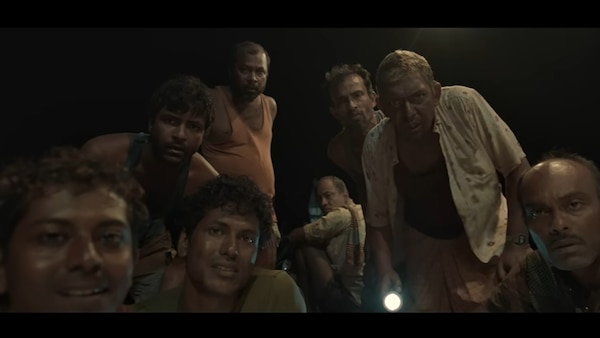Hawa review: Chanchal Chowdhury, Mejbaur Rahman Sumon, and his team create magic in this surreal drama
The film blends Bengal’s very own local folklore with the tale of the perilous journey of a bunch of fishermen in the middle of the deep sea and their trawler becomes the theatrical landscape of a magic realism drama.

Last Updated: 08.37 PM, Oct 31, 2022
Story: Chaan Majhi (Chanchal Chowdhury, head sailor) and his group of fishermen embark on a deep-sea fishing trip. Their trawler encounters a series of mysterious events that starts with a woman (Gulti, Nazifa Tushi) falling into their fishing net. Hawa blends Bengal’s very own local folklore with the tale of the perilous journey of a bunch of fishermen in the middle of the deep sea and their trawler becomes the theatrical landscape of a magic realism drama.
Review: First things first, Hawa does not look like a directorial debut and in parts is quite unlike anything else made before. Mejbaur Rahman Sumon’s credit begins with the fact that he has made a movie that dozens of seasoned filmmakers could not have done better. From the standpoint of cinematography, sound, music, technical teamwork, and of course, acting— Hawa presents solid collaboration under the leadership of Mejbaur Rahman Sumon.
Every department in the film has shown special care. Here is an example. Chan Majhi calls Nagu (Nasir Uddin Khan) at the upper deck of the trawler to have a word. Eja (Sumon Anwar) – Chan’s right-hand man – offers him a joint. Chan speaks as Nagu smokes up and as he gets high on the ganja joint, his vision gets blurry and audibility fades away. The sound of Chan’s speech also fades away for the viewers as they become part of the trippy conversation in no time. There are many such instances.
Hawa starts with banter and scuffle between the fishermen and then takes a route of lust and sexual jealousy and finally culminates into a fairy tale going terribly wrong. The film escorts the audience into the deep blue sea effortlessly within a couple of minutes of the film. The storyline is definitely not the focus of the film as it takes a surreal route to present the unconventional tale. By the end of the film, it seems superfluous to find logic in the magic realism that Hawa presents. It does not take any effort to make people understand its flow. But the script flows seamlessly. There is intrinsic credibility in the script, characters, and dialogues in the film. The fishermen’s body language, banter, superstitions, verbal spat, and inner politics look authentic. This genuineness helps the magic realism cast its spell more profoundly on the viewers.
Also read: Chanchal Chowdhury on Hawa: The film’s success lies in its simplicity and diligence in making
The script also allows an easy coexistence of contradictory traits of characters. The simplicity of fishermen’s carefree life gets overwhelmed by the basic instincts of jealousy and fear and the later half of Hawa captures it beautifully.
Mejbaur Rahman Sumon has made Hawa for theatres. And it is the outstanding cinematography by Kamrul Hasan Khoshru that makes the film a delightful watch on the big screen. He captures an elaborate spectrum of the sea and mixes it with the life of fishermen. With a fascinating craft in the song Sada Sada Kala Kala (the soundtrack that marked the beginning of the public frenzy about Hawa) and the magic of underwater waves Kamrul Hasan Khosru and co-cinematographer Tanveer Ahmed Shovon win hearts. Their magical and smart camerawork is a treasure in the film.
Finally, it is the acting that leaves the audience absolutely spellbound at the theatres. Chanchal Chowdhury is nothing short of a superstar in Kolkata right now and rightfully so. He rules every frame of Hawa. Let alone his acting skills, he speaks throughout the film in a hoarse voice. Chan Majhi’s ruthless wisdom, murky past, and survival zeal get encapsulated in his voice. He owns the fishermen and he knows it. Also, it is not just him. Every single actor in the film – Sumon Anowar as Eja, Shohel Mondol as Urkes, Nasir Uddin Khan as the funny and dodgy Nagu, Rizvi Rizu as Parkes – every single actor playing the fisherman presents a convincing performance. Sariful Razz shifts between a rebellious Iba and the smitten Iba effortlessly. It takes forever to know that Nazifa Tushi is Gulti. She doesn’t speak most of the film and yet her presence makes a tremendous impact. She is a seductress yet a revengeful woman, an enigma on the whole and Tushi is great at every move.
Verdict: Hawa is a film of global standard in terms of its craftsmanship. And yet it tells a tale that is very local – purely Bengali at its core. This blend is the real magic that gets reflected on the screen. Ever since the release of the song Sada Sada Kala Kala, the film has reached a never-seen-before hype. While the release of the film in India remains uncertain, the craze around it is worth every penny. It is a film worth watching and feeling really good about.
Subscribe to our newsletter for top content, delivered fast.

